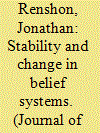| Srl | Item |
| 1 |
ID:
084027


|
|
|
|
|
| Publication |
2008.
|
| Summary/Abstract |
Cognitive frameworks and belief systems are the primary lenses through which presidents view the world. Two important questions are whether these beliefs ever change significantly, and if so, what causes these changes? This article develops empirical data on the strategic and operational beliefs of President George W. Bush (GWB) as a means of examining the theoretical basis for how and why core beliefs change. The author analyzes the foreign policy operational code of President Bush in four separate phases of his political career: the immediate prepresidential phase; his nine months in office prior to September 11, 2001; the six months immediately following the 9/11 terrorist attacks; and his last year in office as a second-term president. The results of this article allow us to address several recurring questions that concern the Bush administration and presidents' belief systems and decision making. They challenge traditional interpretations of the Bush presidency and provide some insights into the causal mechanisms that underlie belief change.
|
|
|
|
|
|
|
|
|
|
|
|
|
|
|
|
| 2 |
ID:
083999


|
|
|
|
|
| Publication |
2008.
|
| Summary/Abstract |
This project is an integrated quantitative and qualitative examination of the influences on U.S. foreign policy toward a sample of Middle East states (Israel, Iraq, and Saudi Arabia) over the last quarter century. Examinations of general trends in the relationships between these dyads, regression analyses, and brief case studies look at a number of factors contributing to the construction of these relationships, what these relationships look like, and how they have changed over time. The findings show that both policy reciprocation and U.S. executive play key roles in determining U.S. foreign policy outcomes. Also discussed is the utility of a broad-based research approach including the integration of qualitative and quantitative work, the examination of individual-level, state-level, and structure-level influences in an inclusive framework, as well as the taking interactive trends over time and the various degrees of conflict within these trends ("high,""low," and "middle") into account
|
|
|
|
|
|
|
|
|
|
|
|
|
|
|
|